高教版大学英语泛读教程4(第三版)电子教案Unit 2
大学英语泛读第四册第三版
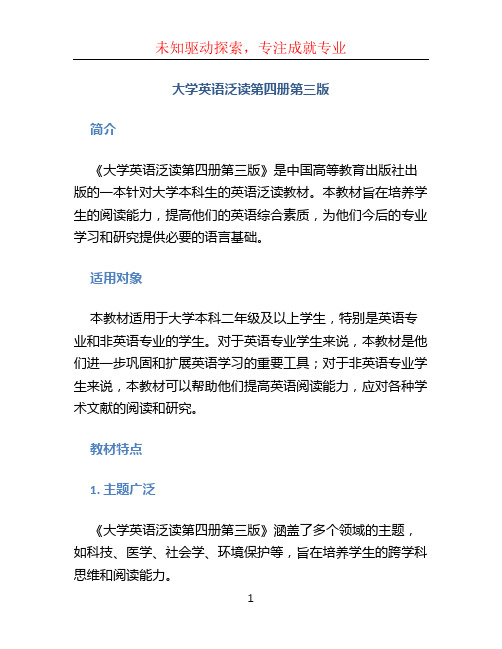
大学英语泛读第四册第三版简介《大学英语泛读第四册第三版》是中国高等教育出版社出版的一本针对大学本科生的英语泛读教材。
本教材旨在培养学生的阅读能力,提高他们的英语综合素质,为他们今后的专业学习和研究提供必要的语言基础。
适用对象本教材适用于大学本科二年级及以上学生,特别是英语专业和非英语专业的学生。
对于英语专业学生来说,本教材是他们进一步巩固和扩展英语学习的重要工具;对于非英语专业学生来说,本教材可以帮助他们提高英语阅读能力,应对各种学术文献的阅读和研究。
教材特点1. 主题广泛《大学英语泛读第四册第三版》涵盖了多个领域的主题,如科技、医学、社会学、环境保护等,旨在培养学生的跨学科思维和阅读能力。
2. 文章多样本教材选取了多种形式和风格的文章,包括新闻报道、科学论文、社论、散文等。
这样的多样性可以帮助学生熟悉不同类型的英语文本,提高他们的阅读水平和理解能力。
3. 任务指导每篇文章都配有任务指导,帮助学生在阅读过程中更好地理解文章内容。
任务指导包括预读问题、词汇翻译、主题分析等,通过这些指导,学生可以更深入地理解文章,并培养自主学习的能力。
4. 词汇与语法练习《大学英语泛读第四册第三版》还包括词汇与语法练习部分,帮助学生巩固和扩展他们在阅读过程中所学到的词汇和语法知识。
这些练习旨在让学生更深入地运用所学知识,并提高他们在写作和口语方面的语言表达能力。
使用方法1. 课堂教学教师可以根据教材提供的课堂活动和教学指导,设计相应的课堂教学方案。
在课堂上,教师可以组织学生进行小组活动、讨论和演讲,以促进学生对文章内容的理解和思考。
2. 自主学习学生可以根据教材提供的任务指导和习题进行自主学习。
在自主学习过程中,学生可以通过阅读、思考和解答问题,提高他们的阅读能力和英语综合素质。
3. 辅助工具除了教材本身,学生还可以利用网络和词典等辅助工具来扩展阅读材料和查阅生词。
这些工具可以帮助学生更全面地理解文章内容,并提高他们的词汇量和阅读速度。
高教版大学英语泛读教程4(第三版)电子教案Review 03
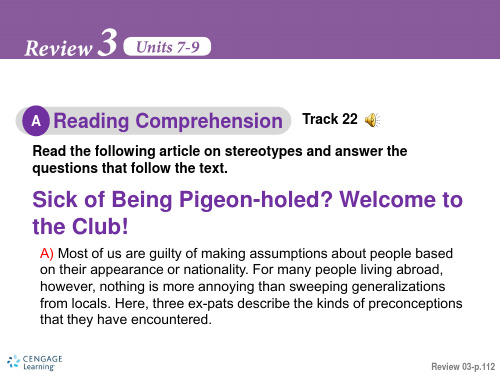
Charles, 39, Shanghai
B) I came here to teach English in my early 20s and eventually moved into business, running a small import-export operation. I majored in Mandarin Chinese back in the U.S. and continued my language studies here. I’m now fluent in Chinese and my reading is just about perfect, I’m married to a local woman and have three kids who were all born and raised here. Granted, I haven’t got Chinese citizenship, as that would have involved me renouncing my American citizenship. I wasn’t prepared to do that as it would have caused me too many headaches, not least of which would have been having to get a visa every time I wanted to go back to visit family. But I have permanent residency in China and consider this my home. Despite all this, most Chinese people will always see me as an outsider.
英语泛读教程4unit2ThreeDaystoSee课文和译文

英语泛读教程4unit2ThreeDaystoSee课文和译文第一篇:英语泛读教程4unit 2 Three Days to See课文和译文Three Days to Seeby Helen KellerHelen Keller, blind and deaf from infancy, became a successful lecturer, author and educator with the help of her teacher.In the following essay, she discussed how people should value their ability to see.All of us have read thrilling stories in which the hero had only a limited and specified time to live.Sometimes it was as long as a year;sometimes as short as twenty-four hours.But always we were interested in discovering just how the doomed man chose to spend his last days or his last hours.I speak, of course, of free men who have a choice, not condemned criminals whose sphere of activities is strictly delimited.Such stories set us thinking, wondering what we should do under similar circumstances.What events, what experiences, what associations should we crowd into those last hours as mortal beings? What happiness should we find in reviewing the past, what regrets?Sometimes I have thought it would be an excellent rule to live each day as if we should die tomorrow.Such an attitude would emphasize sharply the values of life.We should live each day with a gentleness, a vigor, and a keenness of appreciation which are often lost when time stretches before us in the constant panorama of more days and months and years to come.There are those, of course, who would adopt the Epicurean motto of “Eat, drink, and be merry;” but most people would be chastened by the certainty of impending death.In stories, the doomed hero is usually saved at the last minute by some stroke of fortune, but almost always his sense of values is changed.Hebecomes more appreciative of the meaning of life and its permanent spiritual values.It has often been noted that those who live, or have lived, in the shadow of death bring a mellow sweetness to everything they do.Most of us, however, take life for granted.We know that one day we must die, but usually we picture that day as far in the future.When we are in buoyant health, death is all but unimaginable.We seldom think of it.The days stretch out in an endless vista.So we go about our petty tasks, hardly aware of our listless attitude toward life.The same lethargy, I am afraid, characterizes the use of all our faculties and senses.Only the deaf appreciate hearing, only the blind realize the manifold blessings that lie in sight.Particularly does this observation apply to those who have lost sight and hearing in adult life.But those who have never suffered impairment of sight or hearing seldom make the fullest use of these blessed faculties.Their eyes and ears take in all sights and sounds hazily, without concentration, and with little appreciation.It is the same old story of not being grateful for what we have until we lose it, of not being conscious of health until we are ill.I have often thought it would be a blessing if each human being were stricken blind and deaf for a few days at some time during his early adult life.Darkness would make him more appreciative of sight;silence would teach him the joys of sound.Now and then I have tested my seeing friends to discover what they see.Recently I was visited by a very good friend who had just returned from a long walk in the woods, and I asked her what she had observed.“Nothing in particular,” she replied.I might havebeen incredulous had I not been accustomed to such responses, for long ago I became convinced that the seeing see little.How was it possible, I asked myself, to walk for an hourthrough the woods and see nothing worthy of note? I who cannot see find hundreds of things to interest me through mere touch.I feel the delicate symmetry of a leaf.I pass my hands lovingly about the smooth skin of a silver birch, or the rough shaggy bark of a pine.In spring I touch the branches of trees hopefully in search of a bud, the first sign of awakening Nature after her winter's sleep.I feel the delightful, velvety texture of a flower, and discover its remarkable convolutions;and something of the miracle of Nature is revealed to me.Occasionally, if I am very fortunate, I place my hand gently on a small tree and feel the happy quiver of a bird in full song.I am delighted to have the cool water of a brook rush through my open fingers.To me a lush carpet of pine needles or spongy grass is more welcome than the most luxurious Persian rug.To me the pageant of seasons is a thrilling and unending drama, the action of which streams through my finger tips.At times my heart cries out with longing to see all these things.If I can get so much pleasure from mere touch, how much more beauty must be revealed by sight.Yet, those who have eyes apparently see little.The panorama of colour and action which fills the world is taken for granted.It is human, perhaps, to appreciate little that which we have and to long for that which we have not, but it is a great pity that in the world of light the gift of sight is used only as a mere convenience rather than as a means of adding fullness to life.If I were the president of a university I should establish a compulsory course in “How to Use Your Eyes”.The professor would try to show his pupils how they could add joy to their lives by really seeing what passes unnoticed before them.He would try to awake their dormant and sluggish faculties.Suppose you set your mind to work on the problem of how you would use your own eyes if you had onlythree more days to see.If with the oncoming darkness of the third night you knew that the sun would never rise for you again, how would you spend those three precious intervening days? What would you most want to let your gaze rest upon?I, naturally, should want most to see the things which have become dear to me through my years of darkness.You, too, would want to let your eyes rest long on the things that have become dear to you so that you could take the memory of them with you into the night that loomed before you.I should want to see the people whose kindness and gentleness and companionship have made my life worth living.First I should like to gaze long upon the face of my dear teacher, Mrs.Anne Sullivan Macy, who came to me when I was a child and opened the outer world to me.I should want not merely to see the outline of her face, so that I could cherish it in my memory, but to study that face and find in it the living evidence of the sympathetic tenderness and patience with which she accomplished the difficult tasks of my education.I should like to see in her eyes that strength of character which has enabled her to stand firm in the face of difficulties, and that compassion for all humanity which she has revealed to me so often.I do not know what it is to see into the heart of a friend through that “window of the soul”, the eye.I can only “see” through my finger tips the outline of a face.I can detect laughter, sorrow, and many other obvious emotions.I know my friends from the feel of their faces.But I cannot really picture their personalities by touch.I know their personalities, of course, through other means, through the thoughts they express to me, through whatever of their actions are revealed to me.But I am denied that deeper understanding of them which I am sure would come through sight of them throughwatching their reactions to various expressed thoughts and circumstances, through noting the immediate and fleeting reactions of their eyes and countenance.Friends who are near to me I know well, because through the months and years they reveal themselves to me in all their phases;but of causal friends I have only an incomplete impression, an impression gained from a handclasp, from spoken words which I take from their lips with my finger tips, or which they tap into the palm of my hand.How much easier, how much more satisfying it is for you who can see to grasp quickly the essential qualities of another person by watching the subtleties of expression, the quiver of a muscle, the flutter of a hand.But does it ever occur to you to use your sight to see into the inner nature of a friend or acquaintance? Do not most of you seeing people grasp casually the outward features of a face and let it go at that?For instance, can you describe accurately the faces of five good friends? Some of you can, but many cannot.As an experiment, I have questioned husbands of long standing about the color of their wives' eyes, and often they express embarrassed confusion and admit that they do not know.And, incidentally, it is a chronic complaint of wives that their husbands do not notice new dresses, new hats, and changes in household arrangements.The eyes of seeing persons soon become accustomed to the routine of their surroundings, and they actually see only the startling and spectacular.But even in viewing the most spectacular sights the eyes are lazy.Court records reveal every day how inaccurately “eyewitnesses” see.A given event will be “seen” in several different ways by as many witnesses.Some see more than others, but few see everything that is within the range of their vision.Oh, the things that I shouldsee if I had the power of sight for just three days!(1634 words)译文假如我有三天光明海伦·凯勒海伦·凯勒自幼就又盲又聋,在老师的帮助下成为一名成功的讲师、作家及教育家。
高教版大学英语泛读教程4(第三版)电子教案Review 04
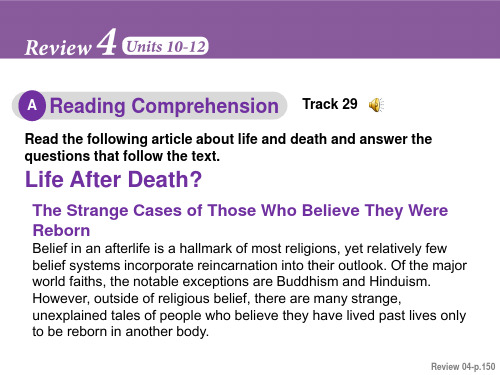
The Barra Boy
Another child who appeared to believe he had lived a previous existence is Cameron Macauley. From the age of two, the Scots youngster told his mother that he had lived on the small island of Barra off Scotland’s west coast. He recalled his life there in a white house by the beach and remembered that his father was called Shane Robertson. As he increasingly yearned to visit the island, his mother agreed to take him there as part of documentary, accompanied by a child psychologist who had carried out research into claims of reincarnation. Once they had located a house that fit Cameron’s description and — more intriguingly — discovered it had been owned by a family surnamed Robertson, the child was initially excited but then became pensive and withdrawn. Although he appeared to know his way around the house and several of the claims he made proved accurate, research failed to turn up any evidence of a Shane Robertson having lived there.
第三版英语泛读教程第四册答案
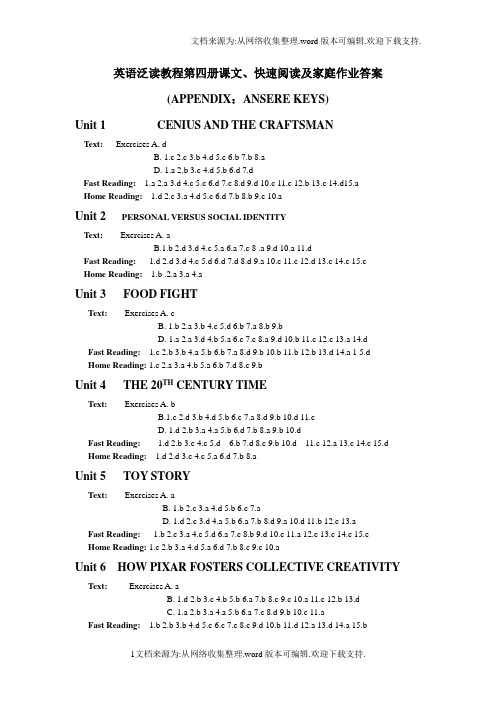
英语泛读教程第四册课文、快速阅读及家庭作业答案(APPENDIX:ANSERE KEYS)Unit 1 CENIUS AND THE CRAFTSMANText:Exercises A. dB. 1.c 2.c 3.b 4.d 5.c 6.b 7.b 8.aD. 1.a 2.b 3.c 4.d 5.b 6.d 7.dFast Reading: 1.a 2.a 3.d 4.c 5.c 6.d 7.c 8.d 9.d 10.c 11.c 12.b 13.c 14.d15.aHome Reading: 1.d 2.c 3.a 4.d 5.c 6.d 7.b 8.b 9.c 10.aUnit 2 PERSONAL VERSUS SOCIAL IDENTITYText:Exercises A. aB.1.b 2.d 3.d 4.c 5.a 6.a 7.c 8 .a 9.d 10.a 11.dFast Reading: 1.d 2.d 3.d 4.c 5.d 6.d 7.d 8.d 9.a 10.c 11.c 12.d 13.c 14.c 15.cHome Reading: 1.b .2.a 3.a 4.aUnit 3 FOOD FIGHTText: Exercises A. cB. 1.b 2.a 3.b 4.c 5.d 6.b 7.a 8.b 9.bD. 1.a 2.a 3.d 4.b 5.a 6.c 7.c 8.a 9.d 10.b 11.c 12.c 13.a 14.dFast Reading: 1.c 2.b 3.b 4.a 5.b 6.b 7.a 8.d 9.b 10.b 11.b 12.b 13.d 14.a 1 5.dHome Reading: 1.c 2.a 3.a 4.b 5.a 6.b 7.d 8.c 9.bUnit 4 THE 20TH CENTURY TIMEText: Exercises A. bB.1.c 2.d 3.b 4.d 5.b 6.c 7.a 8.d 9.b 10.d 11.cD. 1.d 2.b 3.a 4.a 5.b 6.d 7.b 8.a 9.b 10.dFast Reading: 1.d 2.b 3.c 4.c 5.d 6.b 7.d 8.c 9.b 10.d 11.c 12.a 13.c 14.c 15.d Home Reading: 1.d 2.d 3.c 4.c 5.a 6.d 7.b 8.aUnit 5 TOY STORYText: Exercises A. aB. 1.b 2.c 3.a 4.d 5.b 6.c 7.aD. 1.d 2.c 3.d 4.a 5.b 6.a 7.b 8.d 9.a 10.d 11.b 12.c 13.aFast Reading: 1.b 2.c 3.a 4.c 5.d 6.a 7.c 8.b 9.d 10.c 11.a 12.c 13.c 14.c 15.cHome Reading: 1.c 2.b 3.a 4.d 5.a 6.d 7.b 8.c 9.c 10.aUnit 6 HOW PIXAR FOSTERS COLLECTIVE CREATIVITYText: Exercises A. aB. 1.d 2.b 3.c 4.b 5.b 6.a 7.b 8.c 9.c 10.a 11.c 12.b 13.dC. 1.a 2.b 3.a 4.a 5.b 6.a 7.c 8.d 9.b 10.c 11.aFast Reading: 1.b 2.b 3.b 4.d 5.c 6.c 7.c 8.c 9.d 10.b 11.d 12.a 13.d 14.a 15.bHome Reading: 1.b 2.c 3.b 4.d 5.b 6.b 7.b 8.d 9.cUnit 7 POSTMORTEM WITH STRINGSText: Exercises A. cB. 1.c 2.a 3.a 4.b 5.d 6.a 7.b 8.cD. 1.a 2.d 3.c 4.d 5.a 6.a 7.b 8.b 9.c 10.d 11.a 12.b 13.cFast Reading: 1.a 2.d 3.c 4.b 5.a 6.d 7.b 8.d 9.c 10.b 11.d 12.b 13.b 14.c 15.dHome Reading: 1.d 2.d 3.b 4.d 5.c 6.a 7.b 8.a 9.b 10.cUnit 8 THE LIFE OF SAMUEL JOHNSONText: Exercises c.B. 1.d 2. c 3.b 4.b 5 a. 6. c 7.a 8.cD. 1. c2.d 3.a 4. c 5. a 6. b 7. d 8. c 9. b 10.b 11.d 12.d 13.d 14.c 15.dFast Reading: 1.a 2.c 3. a 4. a 5. d 6. b 7c . 8. d 9. d 10. c 11.d 12. d 13. d 14.c 15.d Home Reading: 1.a 2. d 3. d 4.d 5.b 6.c 7.d 8. bUnit 9 THE ARCHAEOLOGISTS WHO WOULDN’T DIGText: Exercises A. bB. 1.b 2.a 3.d 4.c 5.d 6.a 7.b 8.cD. 1.a 2.c 3.b 4.a 5.c 6.d 7.a 8.b 9.c 10.a 11.c 12.a 13.b 14.c 15.a 16.c17.d 18.b 19.aFast Reading: 1.a 2.ac3.c 4.d 5.b 6.a 7.b 8.c 9.c 10.d 11.c 12.b 13.c 14.a 15.dHome Reading: 1.b 2.c 3.d 4.a 5.c 6.b 7.d 8.a 9.d 10.dUnit 10 IS WEATHER GETTING WORSE?Text: Exercises A. cB. 1.c 2.b 3.b 4.c 5.b 6.c 7.b 8.b 9.c 10.cD. 1.b 2.a 3.c 4.b 5.a 6.d 7.d 8.a 9.c 10.a 11.c 12.b 13.b 14.aFast Reading: 1.a 2.b 3.b 4.d 5.a 6.c 7.b 8.b 9.d 10.a 11.d 12.c 13.d 14.d 15.bHome Reading: 1.c2.c 3.c4.a 5.d 6.b 7.d 8.d 9.b 10.cUnit 11 PERSONAL NAMESText: Exercises A. bB. 1.b 2.a 3.a 4.c 5.d 6.c 7.b 8.cD. 1.d 2.a 3.a 4.d 5.b 6.c 7.b 8.a 9.c 10.aFast Reading: 1.c 2.a 3.b 4.d 5.d 6.a 7.c 8.c 9.d 10.a 11.c 12.c 13.d 14.d 15.bHome Reading: 1.c 2.a 3.c 4.a 5.d 6.b 7.a 8.b 9.a 10.cUnit 12 WHY PEOPLE WORKText: Excises A. bB. 1.d 2.a 3.b 4.d 5.d 6.b 7.c 8.d 9.cD. 1.b 2.a 3.a 4.b 5.b 6.c 7.a 8.b 9.c 10.b 11.b 12.a 13.c 14.b 15.aFast Reading: 1.d 2.d 3.b 4.b 5.b 6.d 7.d 8.c 9.b 10.c 11.c 12.b 13.c 14.d 15.aHome Reading: 1.d 2.c 3.c 4.b 5.d 6.b 7.cUnit 13 THE HAPPINESSText: Exercises bB. 1.a 2.b3.b 4.d5.c 6.a 7. c 8.c 9.cD. 1.a 2.b 3.b 4.a 5.b 6.d 7.a 8.c 9. c10.c 11. d 12. b 13.d 14.aFast Reading: 1.d 2.a 3.d 4.d5.d 6.c 7.b 8.c 9.a 10.a 11.c 12.b 13.b 14.d 15.d Home Reading: 1.b 2.c 3.d 4.c 5.c 6.b 7.cd 8.a d.a 10.b 11.dUnit 14 THE AMERICAN SCHOLARText: Exercises cB. 1c. 2.d 3.b 4.b 5.d 6.d 7.c 8.d 9.d 10.dD. 1.c. 2.d 3.b 4.a 5. d 6.d 7.a 8. a 9.b 10.a 11.c 12.a 13.a 14.dFast Reading: 1.a 2.c 3.b 4. a 5.d 6.d 7. d 8.b 9.c 10. c 11.d 12.b 13.c 14. d15.b Home Reading: 1. c2. c 3. c 4. a 5.a 6. c 7.c 8.dUnit 15 THE CHRYSANTHEMUMSText: Exercises A. bB. 1.a 2.d 3.c 4.c 5.a 6.c 7.d 8.b 9.bD. 1.a 2.b 3.c 4.c 5.a 6.b 7.a 8.a 9.d 10.bFast Reading: 1.a 2.c 3.d 4.b 5.a 6.b 7.c 8.c 9.d 10.c 11.c 12.b 13.a 14.d 15.d Home Reading: 1.a 2.c 3.d 4.b 5.c 6.d 7.d 8.b 9.c。
英语泛读教案 4 高教社版
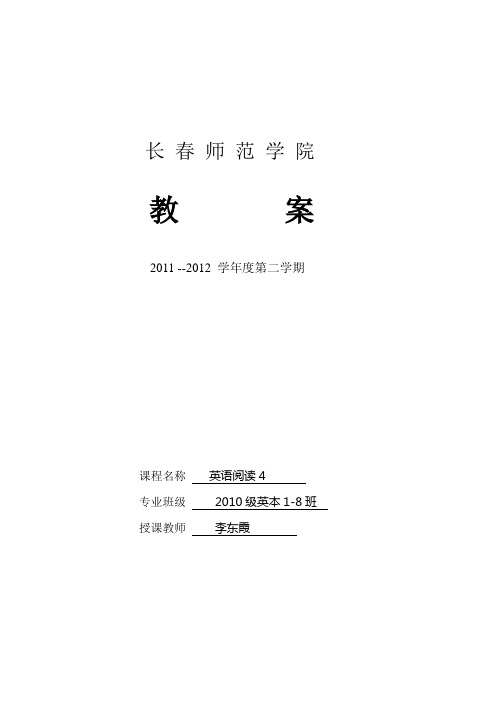
长春师范学院教案2011 --2012 学年度第二学期课程名称英语阅读4专业班级2010级英本1-8班授课教师李东霞本课程教学总体安排课程名称:英语阅读4课程性质与类型:专业必修课总学时﹑学分: 36学时;2学分教学目的与要求:本课程旨在提高学生的英语阅读能力,扩大词汇量,并且掌握基本的阅读技巧。
在此基础上,拓宽学生的视野,培养学生快速准确的获取信息,并且正确的辨别信息的能力;培养学生独立思考,总结文章的中心思想,重点训练学生见“树”亦见“林”的能力。
教材及参考书目:教材:虞苏美黄源深《英语泛读教程4》(第二版)高教版参考书目:1.《朗文当代高级英语词典》商务印书馆2.《金山词霸》Internet3.Jean Zukowski/Faust Susan S.Johnston 《字里行间》《语境阅读》外研社考核方式及成绩计算:考核方式:平时成绩(课堂表现+作业+出勤)+闭卷书面考试成绩计算方法:平时成绩*20%+闭卷书面考试*80%课程教学日历第 1 章教学安排的说明章节题目:Unit 1学时分配:共2学时Text Genius and the Craftsman(1.5 学时)Fast Reading(0.5学时)本章教学目的和要求:To make the Students know the language of the text.1.To make the students know the content of the text.2.To let the students have a discussion on what the text is about.3.To remind the students of rhetoric knowledge and structure of the text. 其它:根据学生的认知程度及时调整教学进度课程教学方案课程名称、授课时数:Unit 1:Text & Fast Reading; 2 hours授课类型:理论课和习题课教学方法与手段:启发式讲授和讨论指导教学目的和要求:1. To make the Students know the language of the text.2. To make the students know the content of the text.3. To let the students have a discussion on what the text is about.4. To remind the students of rhetoric knowledge and structure of the text.教学重点难点:★对Text的理解及对文章的结构教学内容及组织安排:Unit 1: Genius and the CraftsmanI t is to know the process of conceiving a story and developing it into aperfect work of art.About two periods of class will be used for the analysis and discussion of the passage itself.Many people admire writers for their exquisite stories, but few of them know with what painstaking efforts writers work to bring a story into the word. The following passage discusses the process of writing a story in terms of genius and craftsman.1. Robert FrostRobert Frost was born on March 26, 1874 in San Francisco and died on January 29, 1963 in Boston. Frost was an American poet and poet-in- residence at a number of colleges and universities. He was best known for his use of colloquial language, familiar rhythms, and symbols taken from common life to express the quiet values of New England life.His major works include the books of poems A Boy's Will (1913), North of Boston (1914), Mountain Interval (1916) New Hampshire (1923), Steeple Bush (1947), In the Clearing (1962), just mention a few. He also wrote verse Plays, such as A Masque of Reason (1945), and A Masque of Mercy (1947), etc.2. sputnika Russian word, man-made satellite launched by the former Soviet Union.Preview Questions(1) What do you think the meaning of “genius” is?(2) What does a person do to be a genius?(3) Where does genius come from?(4) What do you think the meaning of “craftsman” is?(5) What does a person do to be a craftsman?(6) What relation do you think it is between “genius” and “craftsman”?ⅣEmphasized PointsK ey Words(1)genius(2)craftsman and craftsmanship(3)the creative function(4)conception in the dark of the mind(5)the lucid impression(6)a process of intelligent selection(7)to trust and write(8)rewritingL anguage Notes1. So it is with the reader who comes upon an outstanding story: spellbound, he takes it to his heart, no question asked. (当读者读到一部杰出的小说时,他也会这样如痴如狂,欲将小说字字句句刻骨铭心,绝不会提出任何问题。
英语泛读(4)教案-推荐下载
授课方式 讲授、练习 授课学时 6
教学目标或要求:
对全部高中资料试卷电气设备,在安装过程中以及安装结束后进行高中资料试卷调整试验;通电检查所有设备高中资料电试力卷保相护互装作置用调与试相技互术通关,1系电过,力管根保线据护敷生高设产中技工资术0艺料不高试仅中卷可资配以料置解试技决卷术吊要是顶求指层,机配对组置电在不气进规设行范备继高进电中行保资空护料载高试与中卷带资问负料题荷试22下卷,高总而中体且资配可料置保试时障卷,各调需类控要管试在路验最习;大题对限到设度位备内。进来在行确管调保路整机敷使组设其高过在中程正资1常料中工试,况卷要下安加与全强过,看2度并22工且22作尽22下可22都能2可地护1以缩关正小于常故管工障路作高高;中中对资资于料料继试试电卷卷保破连护坏接进范管行围口整,处核或理对者高定对中值某资,些料审异试核常卷与高弯校中扁对资度图料固纸试定,卷盒编工位写况置复进.杂行保设自护备动层与处防装理腐置,跨高尤接中其地资要线料避弯试免曲卷错半调误径试高标方中高案资等,料,编5试要写、卷求重电保技要气护术设设装交备备4置底高调、动。中试电作管资高气,线料中课并3敷试资件且、设卷料中拒管技试试调绝路术验卷试动敷中方技作设包案术,技含以来术线及避槽系免、统不管启必架动要等方高多案中项;资方对料式整试,套卷为启突解动然决过停高程机中中。语高因文中此电资,气料电课试力件卷高中电中管气资壁设料薄备试、进卷接行保口调护不试装严工置等作调问并试题且技,进术合行,理过要利关求用运电管行力线高保敷中护设资装技料置术试做。卷到线技准缆术确敷指灵设导活原。。则对对:于于在调差分试动线过保盒程护处中装,高置当中高不资中同料资电试料压卷试回技卷路术调交问试叉题技时,术,作是应为指采调发用试电金人机属员一隔,变板需压进要器行在组隔事在开前发处掌生理握内;图部同纸故一资障线料时槽、,内设需,备要强制进电造行回厂外路家部须出电同具源时高高切中中断资资习料料题试试电卷卷源试切,验除线报从缆告而敷与采设相用完关高毕技中,术资要资料进料试行,卷检并主查且要和了保检解护测现装处场置理设。备高中资料试卷布置情况与有关高中资料试卷电气系统接线等情况,然后根据规范与规程规定,制定设备调试高中资料试卷方案。
高教版大学英语泛读教程4(第三版)电子教案Unit 2
A Do You Get It?
Multiple Matching
Scan each of the five paragraphs (a-e) again. Below are a series of newspaper headlines that refer to ideas or information contained in each paragraph. Match the headline to the paragraph.
Before You Start
• Do citizens have to carry identification in your country? If yes, why? If no, what will happen?
• Is identity theft or the misuse of personal data a concern? Have you ever experienced or heard any stories related to it? What are they?
__e___ 1. Victory for the people as government ends Big Brother laws __c___ 2. NIR data to include eye scans __a___ 3. Author’s vision of the future was accurate __d___ 4. Prime Minister says measures will prevent terror __d___ 5. Critics say ID cards just more paperwork __a___ 6. Figures show most cameras do not belong to government __e___ 7. Victory for database opponents __b___ 8. ID bill passed
英语泛读教程4教案
英语泛读教程4教案Unit 1 Genius and the CraftsmanI. ObjectiveTo know the process of conceiving a story and developing it into a perfect work of art.II. Time ArrangementAbout two periods of class will be used for the analysis and discussion of the passageitself.III. Procedures:1. Greeting;2. Begin the new lesson:1) Answer the pre-reading questions orally; 2) Learn some related information;3) Allow students 3 minutes to go over the text rapidly for the main idea;4) Do the guesswork of vocabulary;5) Study the Text extensively;3. Ex. about the text;4. Fast reading passages and Ex.;5. Homework.IV. Related InformationMany people admire writers for their exquisite stories, but few of them know withwhat painstaking efforts writers work to bring a story into the word. The followingpassage discusses the process of writing a story in terms of genius and craftsman.Preview Questions(1) What do you think the meaning of ―genius‖ is?(2) What does a person do to be a genius?(3) Where does genius come from?(4) What do you think the meaning of ―craftsman‖ is?(5) What does a person do to be a craftsman?(6) What relation do you think it is between ―genius‖ and―craftsman‖?V. Emphasized PointsKey Words(1) genius(2) craftsman and craftsmanship(3) the creative function(4) conception in the dark of the mind(5) the lucid impression(6) a process of intelligent selection(7) to trust and write(8) rewriting1VI. Text Comprehension1. Structure AnalysisDivision Paragraph Main IdeaThe firstPart I three An introduction to the topic.paragraphs(1) The necessity of understanding the creative function; The restof Part II (2) the process of conceiving a story; (3) the process of passage developing a story into a perfect work of art.2. Comprehension Questions(1) Why does the writer think it necessary to the creative function?-- The writer believes that understanding of the creative function increases ourwisdom in dealing with the emerging story by making us aware of two things:genius and craftsman or craftsmanship.(2) How is a story conceived?-- A story is conceived when some experience of the present provokes thecombination of one‘s early impressions.(3) What is the principle of a story‘s life?-- Like any seed, the seed of a story has its own principle of growth: a) a processof intelligent selection, b) rarely presents itself as a whole.(4) What are the three functions of the craftsman?-- Trust, write, and generating skill.Topic for Discussion, Is it possible for a writer to start writing on impulse and then catch some good ideas flashing into his mind during the process of writing? Cite examples to illustrate your point., Do you think it is true a good story is not written but rewritten? Why or why not? 3. Teaching Points for Reference(1). So it is with the reader who comes upon an outstanding story: spellbound, he takes it to his heart, no question asked.(当读者读到一部杰出的小说时,他也会这样如痴如狂,欲将小说字字句句刻骨铭心,绝不会提出任何问题。
高教版大学英语泛读教程4(第三版)电子教案Unit-3
Before You Start
• Have you ever been unfairly accused of something? If so, what is it?
• What kind of reputation does your country or city have? Do you think it is worthy of the reputation?
U3-p.26
Omar, Vultures
If you’ve ever seen wildlife documentaries, you’ll probably have a low opinion of these carrion-eating raptors. Vultures get a really bad rap and, while it’s not difficult to see why, I think their image is pretty unfair. But for their admittedly unattractive appearance and dining habits, these flying scavengers would be appreciated by more of us for the vital role they play in the food chain. As they have powerful stomach acids, vultures are able to consume the putrid meat of animal carcasses without any ill effects from the bacteria. Without vultures, this meat would remain rotting, allowing disease to spread, especially in hot climates. Rather than detesting these feathered garbage disposal units, we should be praising them for the great job they’re doing.
- 1、下载文档前请自行甄别文档内容的完整性,平台不提供额外的编辑、内容补充、找答案等附加服务。
- 2、"仅部分预览"的文档,不可在线预览部分如存在完整性等问题,可反馈申请退款(可完整预览的文档不适用该条件!)。
- 3、如文档侵犯您的权益,请联系客服反馈,我们会尽快为您处理(人工客服工作时间:9:00-18:30)。
A Do You Get It?
Multiple Matching
Scan each of the five paragraphs (a-e) again. Below are a series of newspaper headlines that refer to ideas or information contained in each paragraph. Match the headline to the paragraph.
U2-p.14
These objections notwithstanding, the government argued that the NIR and ID cards would be beneficial to society. They would help prevent terrorist attacks, such as the London suicide bombings of July 7, 2005, which killed 56 people, and would assist in tackling illegal immigration and identity fraud. Even though some security experts agreed with these views, many others rebutted them. It was pointed out that the four 7/7 bombers were actually all British citizens. Since the police appear to have known the identity of at least one of them, the assertion that the NIR system could have stopped them seems weak. In the case of illegal immigration, critics observed that ID cards would make no difference because a passport and visa system is already in place. If the current system isn’t working, why should an extra layer of bureaucracy make any difference? Finally, statistics show that identity theft is actually easier and more prevalent in countries with ID cards.
• Do citizens have to carry identification in your country? If yes, why? If no, what will happen?
• Is identity theft or the misuse of personal data a concern? Have you ever experienced or heard any stories related to it? What are they?
• Are there fears over government misuse of personal information? If yes, where are the fears from?
U2-p.13
Reading Track 4
A Database State
It’s an uncomfortable fact, but every country watches the movements of its citizens. There are varying degrees of surveillance. However, you might be surprised to learn that the U.K. has been described as one of the most surveyed countries in the world. The main reason for this is that it has more closecircuit television (CCTV) cameras in use than any other democratic country. Despite statistics suggesting that over 90 percent of these cameras are in private hands, people remain concerned about official snooping. The government insists the cameras are there to prevent crime and to keep people safe; yet statistics show that a tiny percentage of criminal cases are solved using CCTV evidence. In spite of this, the authorities continue to champion the use of public surveillance. It seems the Big Brother society foretold by the British author George Orwell in his famous novel 1984 has come to pass; indeed, for many people, this is just the tip of the iceberg.
U2-p.15
The naysayers eventually won the day. In 2010, the NIR system was abandoned; the ID cards were scrapped the following year. Regardless of this climbdown, manyБайду номын сангаасBritish citizens remain convinced that the government continues to poke its nose into the private affairs of its citizens.
2
Under Watchful Eyes
Reading: A Database State Words to Know: Privacy; key word: watch Further Reading: Hack Attack, How You Might Be a Target?
Before You Start
__e___ 1. Victory for the people as government ends Big Brother laws __c___ 2. NIR data to include eye scans __a___ 3. Author’s vision of the future was accurate __d___ 4. Prime Minister says measures will prevent terror __d___ 5. Critics say ID cards just more paperwork __a___ 6. Figures show most cameras do not belong to government __e___ 7. Victory for database opponents __b___ 8. ID bill passed
U2-p.14
In fact, the system would amount to a gigantic “meta-database” – in other words a network of interlocking databases. A total of 50 categories of information would be kept on any individual including biometric information – fingerprints, and digitized facial and iris scans – and a list of all current and past places of residence. Consequently, opponents protested that this was a violation of people’s human rights insofar as it allowed government agencies – and even private organizations – to share personal data on an unprecedented scale with no accountability. Furthermore, in certain circumstances, people would be forced to submit their personal data to the NIR against their will. In order to get a new passport, for example, applicants would have no choice but to register or else face having their application rejected. Other concerns include discrimination against minorities and foreign residents – some of whom would be obligated to carry ID cards – and the possibility of becoming a “non-person” if the data was somehow lost.
